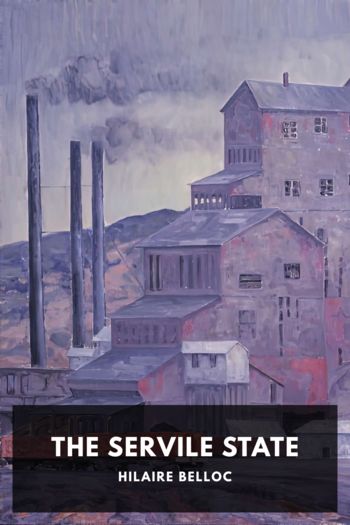The Servile State, Hilaire Belloc [ebook pdf reader for pc TXT] 📗

- Author: Hilaire Belloc
Book online «The Servile State, Hilaire Belloc [ebook pdf reader for pc TXT] 📗». Author Hilaire Belloc
It is possible to portray a great social movement of the past with accuracy and in detail if one can spare to the task the time necessary for research and further bring to it a certain power of coordination by which a great mass of detail can be integrated and made one whole.
Such a task is rarely accomplished, but it does not exceed the powers of history.
With regard to the future it is otherwise. No one can say even in its largest aspect or upon its chief structural line what that future will be. He can only present the main tendencies of his time: he can only determine the equation of the curve and presume that that equation will apply more or less to its next developments.
So far as I can judge, those societies which broke with the continuity of Christian civilisation in the sixteenth century—which means, roughly, North Germany and Great Britain—tend at present to the reestablishment of a servile status. It will be diversified by local accident, modified by local character, hidden under many forms. But it will come.
That the mere capitalist anarchy cannot endure is patent to all men. That only a very few possible solutions to it exist should be equally patent to all. For my part, as I have said in these pages, I do not believe there are more than two: a reaction towards well-divided property, or the reestablishment of servitude. I cannot believe that theoretical collectivism, now so plainly failing, will ever inform a real and living society.
But my conviction that the reestablishment of the servile status in industrial society is actually upon us does not lead me to any meagre and mechanical prophecy of what the future of Europe shall be. The force of which I have been speaking is not the only force in the field. There is a complex knot of forces underlying any nation once Christian; a smouldering of the old fires.
Moreover, one can point to European societies which will most certainly reject any such solution of our capitalist problem, just as the same societies have either rejected, or lived suspicious of, capitalism itself, and have rejected or lived suspicious of that industrial organisation which till lately identified itself with “progress” and national well-being.
These societies are in the main the same as those which, in that great storm of the sixteenth century—the capital episode in the story of Christendom—held fast to tradition and saved the continuity of morals. Chief among them should be noted today the French and the Irish.
I would record it as an impression (and no more) that the servile state, strong as the tide is making for it in Prussia and in England today, will be modified, checked, perhaps defeated in war, certainly halted in its attempt to establish itself completely, by the strong reaction which these freer societies upon its flank will perpetually exercise.
Ireland has decided for a free peasantry, and our generation has seen the solid foundation of that institution laid. In France the many experiments which elsewhere have successfully introduced the servile state have been contemptuously rejected by the populace, and (most significant!) a recent attempt to register and to “insure” the artisans as a separate category of citizens has broken down in the face of an universal and a virile contempt.
That this second factor in the development of the future, the presence of free societies, will destroy the tendency to the servile state elsewhere I do not affirm, but I believe that it will modify that tendency, certainly by example and perhaps by direct attack. And as I am upon the whole hopeful that the Faith will recover its intimate and guiding place in the heart of Europe, so I believe that this sinking back into our original paganism (for the tendency to the servile state is nothing less) will in due time be halted and reversed.
Videat Deus.
EndnotesSave in this special sense of “collectivist,” the word “socialist” has either no clear meaning, or is used synonymously with other older and better-known words. ↩
The purchasing power of money fell during this century to about a third of its original standard. £3 (say) would purchase under Charles I the necessities which £1 would have purchased under Henry VIII. Nearly all the receipts of the Crown were customary. Most of its expenses were competitive. It continued to get but £1 where it was gradually compelled to pay out £3. ↩
Before any trust is established in this country, the first step is to “interest” one of our politicians. The Telephones, the South Wales Coal Trust, the happily defeated Soap Trust, the Soda, Fish, and Fruit Trusts, are examples in point. ↩
By which word “property” is meant, of course, property in the means of production. ↩
That this is an illusion I shall attempt to show on a later page. ↩
By an illusion which clever statesmanship could use to the advantage of the community, he even estimates the natural forces he controls (which need no accumulation, but are always present) on the analogy of his capital, and will part with them at “so many years’ purchase.” It is by taking advantage of this illusion that land purchase schemes (as in Ireland) happily work to the advantage of the dispossessed. ↩
Thus you can raid the brewers in a society half-Puritan where brewing is thought immoral by many, but proceed to railway stock and it will be a very different matter. ↩
In using this metaphor I at once record my apologies to those who believe in elliptical and hyperbolic universes, and confess myself an old-fashioned parabolist. Further, I admit that the triangles in question are spherical. ↩
Thus the money levied upon the death of some





Comments (0)